Rage in Gaza isn't directed only at Israel. Some are angry with Hamas too
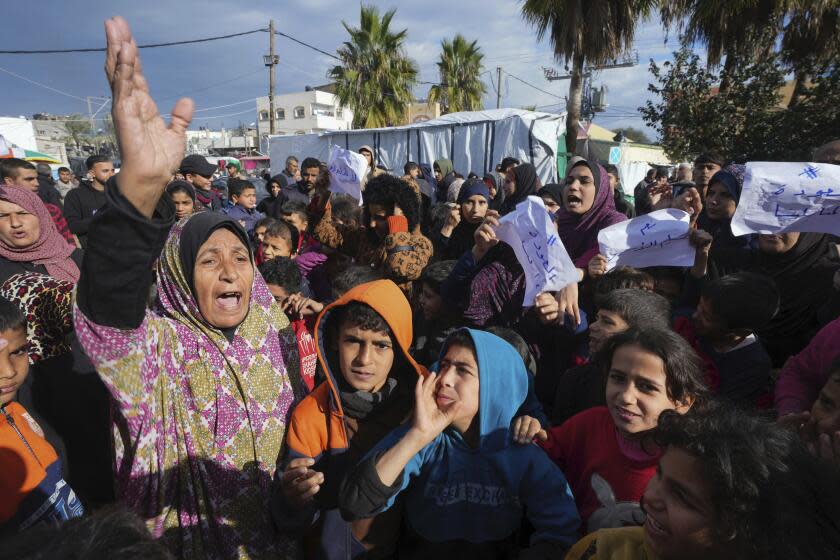
- Oops!Something went wrong.Please try again later.
By the 100-day mark of Israel's offensive in Gaza, Abu Ahmad Al-Gharabli and his 13 family members had been displaced four times before settling in Rafah, at the besieged enclave's southern end.
Forced to sell cigarettes on the street to get by, the 56-year-old blacksmith is angry. At his inability to provide food and shelter for his family. At the scant humanitarian aid he's received.
And, most of all, at Hamas.
"Before they launched Oct. 7, they should have secured food, drink and money so that we wouldn't suffer like this," Al-Gharabli said of the militant group's assault on Israel that triggered the war.
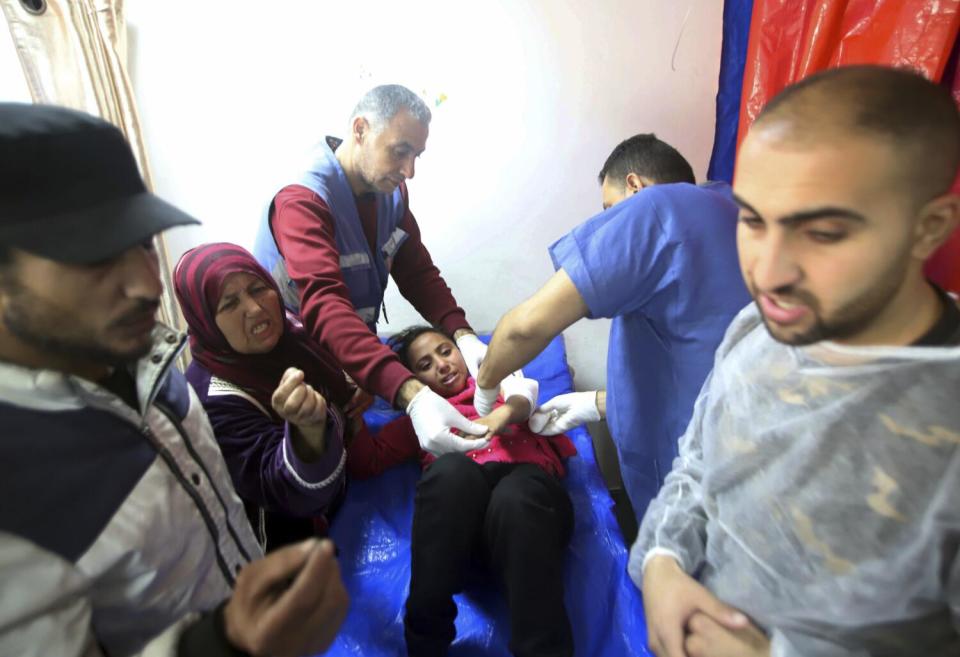
"It seems Hamas didn't consider the consequences," added Al-Gharabli's wife, Umm Ahmad, who, like most people interviewed for this story, gave only her nickname for safety reasons. "They believe they planned for everything, but when it came to us, they didn't. The poverty, the displacement — all this Hamas didn't think about."
More than three months into the most devastating assault Gaza has ever experienced, many residents — 85% of whom are displaced and almost all of whom are at risk of starvation — are growing exasperated with Hamas amid a war that has left no one in the enclave unaffected.
Read more: Israel's media mostly keep Gaza's human toll out of sight
Although the majority of the 2.3-million population hold Israel principally responsible for their suffering, and Hamas retains the support of a significant portion of society, many Gazans feel caught between fealty to the resistance against Israeli occupation of Palestinian lands and a war strategy by their militant rulers that seemed to overlook them.
"Any organization or state that plans for a military attack should have a feasibility study, if you will," said Abu Tawfiq, 35, speaking with the clear diction of the voiceover artist he was before the war. "We've started to ask, 'You go on a military adventure — did you fortify the home front? Did you prepare the simplest means of life for citizens in Gaza?'"
On Oct. 7 — when Hamas commandos killed at least 1,200 people and kidnapped about 240 others, Israeli authorities say — most Gazans celebrated, Abu Tawfiq said, seeing it as a moment of fighting back against Israel and its long siege of the coastal strip.
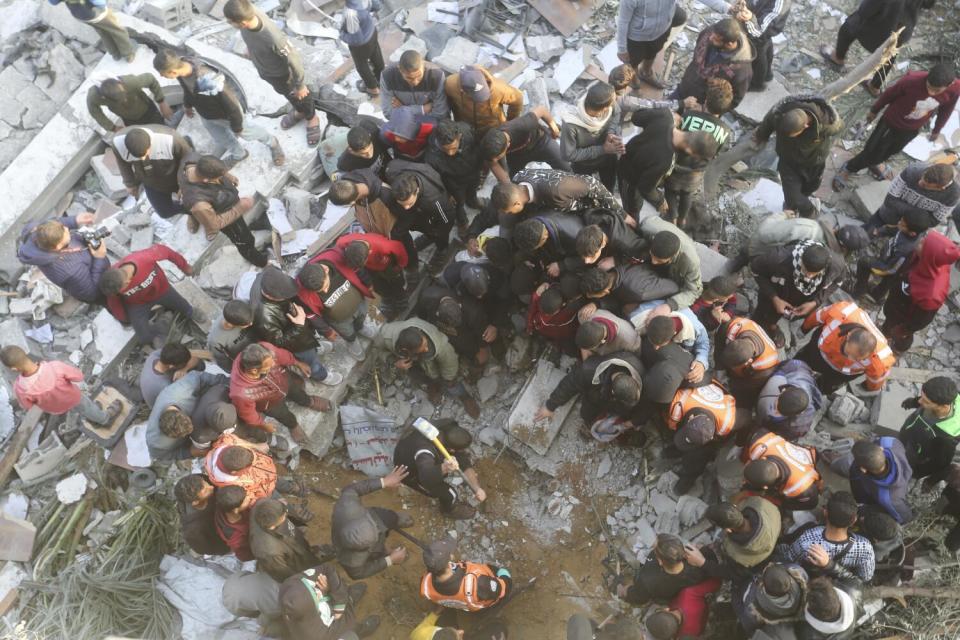
But since then, "it's been a nightmare from which we can't wake up," Abu Tawfiq said. "We're angry. And Hamas neglecting citizens is compounding that anger."
Examples of that neglect abound, he said. With Israel restricting the number of aid trucks going into the Gaza Strip, price gouging was to be expected, which is why, in past confrontations with Israel, Hamas officials or police would be out in marketplaces penalizing offending merchants. This time, with Israeli drones and armor a constant threat, Hamas authorities barely have a presence in the streets — and an ineffectual one at that.
Sugar, at almost $3 a pound, costs seven times more than it did before the war; onions, 13 times; canned goods, six times. Diapers for Al-Gharabli's two grandsons surged to a staggering $38 a pack — and he has to walk two miles to find them.
Read more: 'I just want to run': Mental health care yet another casualty of Gaza war
"There's no supervision. You just don't get a sense there's a government," said Abu Amir Tafesh, 42, who was searching for bottled water for his family.
Problems also riddle the distribution of what few supplies make it into Gaza, some say. During other wars, aid organizations linked to Hamas or Islamic Jihad, another militant group, would give out packages or cash not just to members but also supporters. That's not happening this time.
"Even if you're sitting inside the mosque, you get nothing," Abu Tawfiq said.
The sense of abandonment by Hamas is exacerbated, many say, by the fact that the only gain from the Oct. 7 operation has accrued to the occupied West Bank, where hundreds of imprisoned Palestinians were freed from Israeli prisons in November during a weeklong truce in Gaza.
Read more: High-tech and war are integrating some ultra-Orthodox Jews into Israel's secular society
"All the martyrs, the houses destroyed, the fear ... we're paying the price," Tafesh said.
He's happy that the Palestinian detainees were released. But with more than 26,000 people reported killed by the Israeli bombardment, entire families wiped out and much of the enclave destroyed, Gaza as he knew it is gone.
"People want a way to live in dignity. That's it," Tafesh said. "They're silent now because they're too aggrieved. Even if they want to shout at the government, what use would it be?"
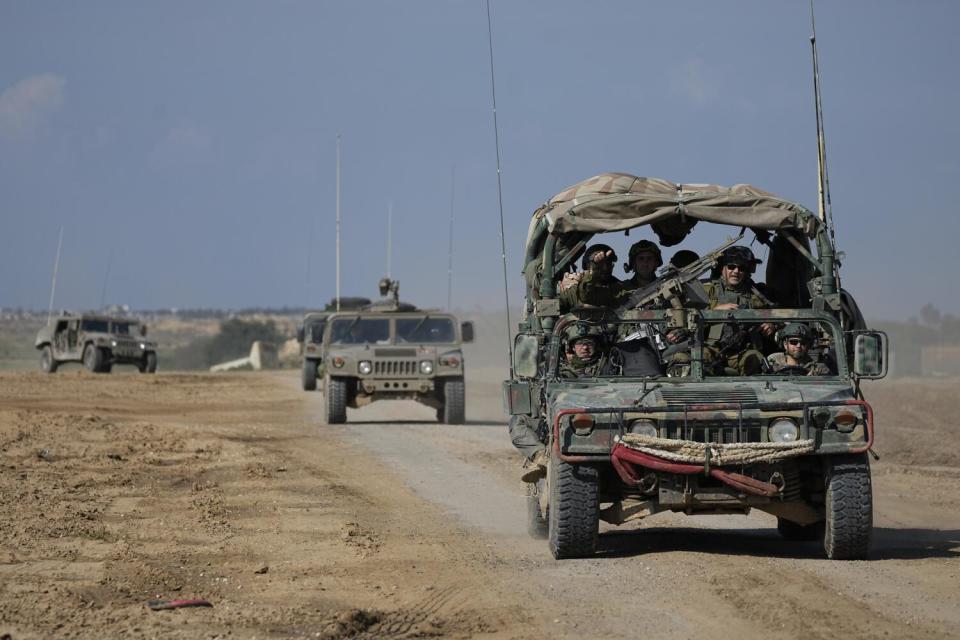
With little sense of Hamas' endgame, many Palestinians are torn over what has happened since Oct. 7. A December poll by the Palestinian Center for Policy and Survey Research — which involved 1,231 respondents, including 480 in Gaza — showed 37% of Gazans labeling Hamas' decision to attack as "incorrect," given the consequences so far.
A majority of Palestinians also say the killing of civilians is not permissible, but they do not believe the Israeli government's allegations or evidence of atrocities by Hamas.
"If the 7th of October didn't happen, we would have stayed humiliated, under the mercy of the occupation all our lives," said 57-year-old Umm Mahmoud Zreik. "For us, the exchange of hostages is not much of an achievement. We need them to do more, like break the siege."
Read more: Scores of Palestinian minors sit in Israeli prisons. He wanted his 13-year-old son to join them
Perhaps in response to such sentiments, Hamas on Sunday issued its first public report about its multipronged cross-border assault, a 16-page document titled "Our Narrative," in which it cited a list of reasons for its attack, including the Israeli government's right-wing policies, the expansion of illegal settlements, the increase in Palestinian detainees and the failure of negotiations over a Palestinian state.
The report also insists that, although "maybe some faults happened" during the "rapid collapse of the Israeli security and military system" during the assault and the "chaos caused along the border areas with Gaza," Hamas fighters did not intentionally target civilians.
About 60% of the Israelis killed Oct. 7 were civilians. Israel accuses Hamas of wanton slaughter and says it has compiled abundant visual evidence and witness testimony that the militants engaged in torture and sexual violence against civilian victims. Hamas blames Israel, pointing to reports in Israeli media that the army was responsible for killing a number of civilians during the engagement with the group's fighters.
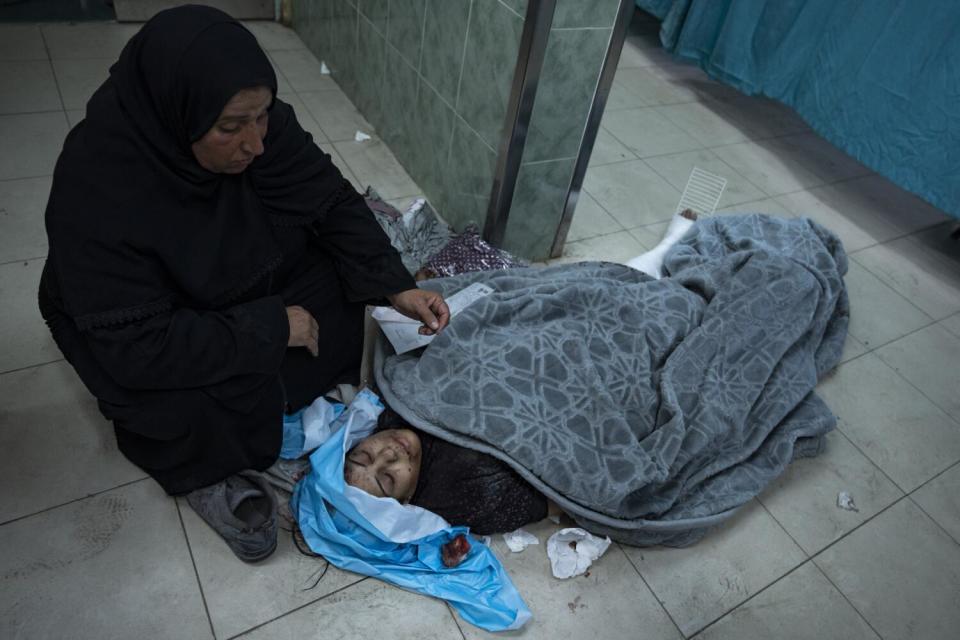
Although there are growing signs in Gaza of disillusionment with Hamas, which has ruled the strip since 2007, it can still count on a loyal base. The December poll found that support for the group rose slightly, to 42% from 38% in Gaza; in the West Bank, it almost quadrupled to 44%.
Inside Gaza, researcher Abdalhadi Alijla sees two trends at work: skepticism of Hamas amid minimal improvements to life after 17 years of its rule and no moves to ease the enclave's isolation, yet also the increasingly dominant belief among Palestinians that armed struggle is the only way to end Israeli occupation.
"The consensus in Gaza is that the resistance is a red line — that it will remain, with or without Hamas," Alijla said, adding that Hamas has never resolved whether it is a governing authority able to provide order, stability and jobs or a liberation movement.
Read more: West Bank violence is growing. Will it open another front in the Israel-Hamas war?
"The popularity of Hamas is greater in the West Bank than in Gaza because those in Gaza tried their rule. They know it," Alijla said.
Hamas maintains that the chief aim of its Oct. 7 incursion was to kidnap Israeli soldiers in order to force a prisoner exchange. But its report makes clear that another goal was to refocus world attention on the Israeli-Palestinian conflict. The report repeatedly castigates Israel's allies and the United Nations for ignoring Palestinians' plight.
As the war grinds on and the question of who will govern Gaza becomes more urgent, anger among some Gazans at Hamas has not translated into greater support for the rival Palestinian Authority, the much-reviled administration that exercises limited control over the West Bank and was violently ousted from the Gaza Strip by Hamas in 2007.
"The authority doesn't have the trust of the people. Even its own officials don't trust it," Alijla said.
Whatever arises as an alternative, said Umm Ahmad, the wife of blacksmith Al-Gharabli, the priority should be providing stability for civilians.
"This living on the streets, this famine, our kids getting sick or injured with nowhere to be treated — for me, I won't accept it," she said. "I need a government that takes care of its people."
The Times’ special correspondent in Gaza cannot be named for security reasons. Staff writer Bulos reported from Beirut.
This story originally appeared in Los Angeles Times.

